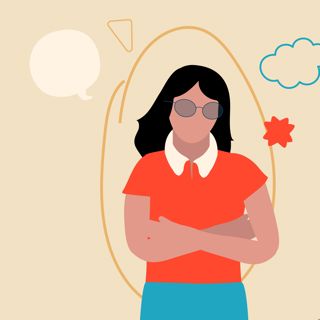
ADHD, social awkwardness, and ghosting (Allison’s story)
Allison O’Keefe, a UX designer in Detroit, always felt she rubbed people the wrong way. Then, in her early teen years, one of her friends confirmed it when she called Allison “the annoying friend” behind her back. This made Allison more cautious in social situations, which often overwhelmed her. Worse, she also found herself accidentally “ghosting” people, forgetting to respond to their messages. Eventually, a therapist asked her if she’d ever been diagnosed with ADHD, and the diagnosis started to make a lot of sense. She now feels less isolated — even as she still grapples with how open she wants to be about her ADHD. How do folks with ADHD navigate these choppy social waters? Listen in as Laura and Allison sort through these questions and more. To find a transcript for this episode and more resources, visit the episode page on Understood.org. We love hearing from our listeners. Email us at ADHDAha@understood.org. Related resources5 ways ADHD can affect social skillsADHD and oversharingADHD and feeling guilty or remorseful Understood.org is a nonprofit organization dedicated to empowering people with learning and thinking differences, like ADHD and dyslexia. If you want to help us continue this work, donate at understood.org/give Hosted by Simplecast, an AdsWizz company. See pcm.adswizz.com for information about our collection and use of personal data for advertising.
8 Aug 202324min
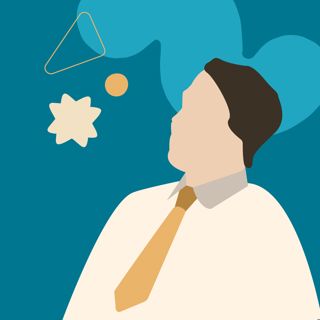
ADHD frustration and anger, plus ADHD and tics (Adam’s story)
Lawyer Adam Sosnik was miserable in his job. Miserable when he couldn’t concentrate, which was often. Miserable because it was physically uncomfortable to focus on even a small thing, like writing a single sentence. The trouble was, he was being treated for anxiety and depression, but not ADHD. When he began working remotely during the COVID-19 pandemic, his wife noticed his frustration. And with her encouragement, he booked an appointment with a new psychiatrist. That led to an ADHD diagnosis, which validated the discomfort Adam felt. But it also marked the beginning of a new struggle. Also in this episode: Adam talks about ADHD and tics and his experience with Tourettic OCD (TOCD). And how he’s charted a new way of living that’s finally made him happy.To find a transcript for this episode and more resources, visit the episode page on Understood.org.We love hearing from our listeners. Email us at ADHDAha@understood.org. Related resourcesADHD and ticsADHD and mood swingsA day in the life of an employee with ADHD Understood.org is a nonprofit organization dedicated to empowering people with learning and thinking differences, like ADHD and dyslexia. If you want to help us continue this work, donate at understood.org/give Hosted by Simplecast, an AdsWizz company. See pcm.adswizz.com for information about our collection and use of personal data for advertising.
25 Juli 202323min
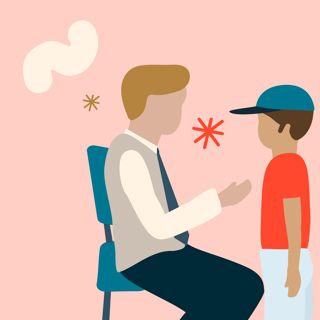
ADHD and depression (Josh’s story)
Pediatrician Josh Maxwell had two “aha” moments that led to his ADHD diagnosis. One came from talking with a teenage patient whose ADHD symptoms were different from what he’d seen in other patients. It wasn’t that the teen couldn’t pay attention, but rather that they were paying attention to everything all at once. Josh related to that feeling. Josh’s other ADHD “aha” came from his experience with depression. After starting antidepressants, he could more clearly see his own ADHD symptoms. Now, the coping strategies he’d put in place for himself, the masking, and even the childhood poem he wrote about fidgeting made perfect sense. Listen to this episode of ADHD Aha! to learn what Josh would rename ADHD, and why pediatrics is the only specialty for him. To find a transcript for this episode and more resources, visit the episode page at Understood. We love hearing from our listeners. Email us at ADHDAha@understood.org. Related resourcesADHD and depressionHow attention worksShould I get tested for ADHD as an adult? Understood.org is a nonprofit organization dedicated to empowering people with learning and thinking differences, like ADHD and dyslexia. If you want to help us continue this work, donate at understood.org/give Hosted by Simplecast, an AdsWizz company. See pcm.adswizz.com for information about our collection and use of personal data for advertising.
11 Juli 202328min

5 ADHD labels to let go of (50th episode special!)
Have you ever noticed that people with ADHD say some pretty negative things about themselves? After recording 50 episodes of the ADHD Aha! podcast, we certainly had noticed this. In this special episode, host Laura Key and producer Jessamine Molli count down the five most common labels and adjectives guests use to describe their ADHD symptoms and behaviors. They listen to clips and dive deep into ADHD myths and stereotypes. Laura also shares her take on what the ADHD Aha! podcast is really about. To find a transcript for this episode and more resources, visit the episode page at Understood. We love hearing from our listeners. Email us at ADHDAha@understood.org. Related resourcesCommon ADHD mythsADHD and the myth of laziness (Rebecca’s story)Remember: ADHD is real Understood.org is a nonprofit organization dedicated to empowering people with learning and thinking differences, like ADHD and dyslexia. If you want to help us continue this work, donate at understood.org/give Hosted by Simplecast, an AdsWizz company. See pcm.adswizz.com for information about our collection and use of personal data for advertising.
27 Juni 202341min

Being trans with ADHD (Max’s story)
Max Siegel (he/they) was diagnosed with ADHD as an adult. Throughout that process, Max encountered some of the same fears and myths around ADHD as he does around transness: “You just want an excuse.” “You just want to be lazy.” Max, an LGBTQ+ transgender and neurodiversity inclusion speaker and consultant, found that coming out gave him resilience. And that same resilience helped him cope with his ADHD diagnosis. Max and host Laura Key also talk about ADHD symptoms and gender identity. Max, who was assigned female at birth, was socialized as a woman until his 20s. He talks about anxiety, rejection sensitivity, and other ADHD-related challenges he’s faced — and how ADHD can get missed because of a person’s gender. A note about this episode: Max talks about how he felt he needed to “convince” his doctor he had ADHD. We can’t speak to the differences between how ADHD is diagnosed and treated in the UK vs. the United States. However, well-trained and credentialed evaluators should be capable of making accurate diagnoses without convincing. For detailed, easy-to-understand information on ADHD diagnosis in adults, listen to Season 2 of our Understood Explains podcast. To find a transcript for this episode and more resources, visit the episode page at Understood. We love hearing from our listeners. Email us at ADHDAha@understood.org. Related resources ADHD and myth of lazinessLGBTQIA+ and ADHD: Tips to support your childADHD and rejection sensitive dysphoria (RSD) Understood.org is a nonprofit organization dedicated to empowering people with learning and thinking differences, like ADHD and dyslexia. If you want to help us continue this work, donate at understood.org/give Hosted by Simplecast, an AdsWizz company. See pcm.adswizz.com for information about our collection and use of personal data for advertising.
13 Juni 202324min

Working mom with ADHD, feeling control over nothing (Cathy Rashidian’s story)
ADHD coach Cathy Rashidian spent the first 20 years of her career climbing the corporate ladder. She was a workaholic with undiagnosed ADHD. Then two major life events shifted her path and perspective. At 35, she was diagnosed with cancer. She kept craving going back to work after treatment, even though she wasn’t ready. Then she had a baby at age 40. She felt overwhelmed and like she had control over nothing. Finally, after her doctor’s fourth suggestion, she got tested for ADHD. From there everything started to make sense. Cathy, who’s also the host of the Proudly ADHD podcast, talks about being a working mom with ADHD, her PMDD diagnosis, and “compassionate scheduling” to feel and function as best as possible. Join host Laura Key and Cathy’s discussion on ADHD in women, parenting, shame, and more. To find a transcript for this episode and more resources, visit the episode page at Understood. We love hearing from our listeners. Email us at ADHDAha@understood.org. Related resourcesCathy’s podcast Proudly ADHDADHD and hormones (Catie’s story)8 common myths about ADHD Understood.org is a nonprofit organization dedicated to empowering people with learning and thinking differences, like ADHD and dyslexia. If you want to help us continue this work, donate at understood.org/give Hosted by Simplecast, an AdsWizz company. See pcm.adswizz.com for information about our collection and use of personal data for advertising.
30 Maj 202325min
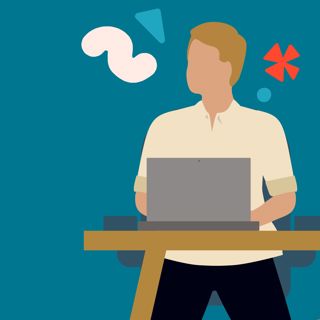
ADHD and feeling “dumb” (Henry’s story)
Growing up, Henry Lang kept hearing that he was too disorganized and “not smart enough.” Then in high school, he was diagnosed with ADHD and started getting support through a 504 plan. Now, Henry is a teacher in Vermont dedicating his career to — and even writing his thesis on — teaching kids with ADHD. He has trouble giving himself the same empathy he shows his students, though. Henry, like many of us with ADHD, often calls the mistakes he makes because of his ADHD “dumb.” Henry and host Laura Key unpack what he really means when he says “dumb” — and how other ADHD-ers might internalize and misuse that word, too.To find a transcript for this episode and more resources, visit the episode page at Understood. We love hearing from our listeners. Email us at ADHDAha@understood.org. Related resourcesCheck out some of Henry’s Understood content: How to declutter your CPU desktop screenAnother ADHD Aha! episode: Not “dumb” or a “hot mess” … it’s ADHD (Jenny’s story)Classroom accommodations for ADHD Understood.org is a nonprofit organization dedicated to empowering people with learning and thinking differences, like ADHD and dyslexia. If you want to help us continue this work, donate at understood.org/give Hosted by Simplecast, an AdsWizz company. See pcm.adswizz.com for information about our collection and use of personal data for advertising.
16 Maj 202324min
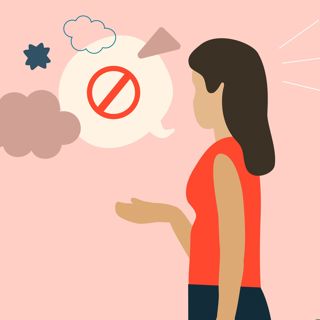
Anxiety, imposter syndrome, and ADHD (Mallory’s story)
Mallory Band was diagnosed with ADHD and anxiety when she was 8 years old. She has two brothers with ADHD, but their ADHD looked different. They were hyperactive on the outside. But Mallory felt hyperactive on the inside. She struggled with perfectionism, people pleasing, and big emotions. As with many women who have ADHD, imposter syndrome set in as she got older. Mallory’s “aha” moment came well after her ADHD diagnosis — when she was in graduate school learning about executive function. It was the first time she had stopped to think about how her own brain worked, and how burnt out she was from pushing herself against it. Now she’s an executive function coach who helps people with ADHD lean into the power of saying “no.” To find a transcript for this episode and more resources, visit the episode page at Understood. We love hearing from our listeners. Email us at ADHDAha@understood.org. Related resourcesMore from Mallory: Imposter syndrome at work: How I stopped feeling like a fakeADHD and anxietyADHD in girls Understood.org is a nonprofit organization dedicated to empowering people with learning and thinking differences, like ADHD and dyslexia. If you want to help us continue this work, donate at understood.org/give Hosted by Simplecast, an AdsWizz company. See pcm.adswizz.com for information about our collection and use of personal data for advertising.
2 Maj 202325min






















